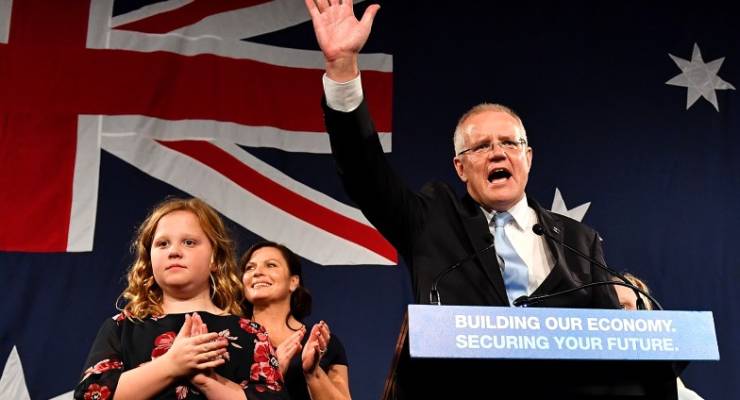
November 4, 2049
The death at 81 of Scott Morrison brings to a close the reign of a man who dominated Australian political life for three decades and transformed his country.
From humble beginnings, Morrison’s rise to national leadership defied the odds and progressive critics, as he repeatedly turned political wisdom on its head and transformed perceived disadvantages into powerful weapons.
Under his prime ministership, Australia defied international trends to dramatically increase its carbon emissions, with a suite of measures that took the nation into a triumphant New Era of Carbon. The establishment of human rights for coal companies in 2024 opened the way to a dramatic expansion of coal mining, even beyond the capacity of what would eventually be eight new coal-fired power stations across the country. Morrison’s brilliant innovation was the establishment of the nation’s first zero-output power station in Townsville, where thousands of tonnes of coal were simply incinerated every year.
His true triumph, however, was the elimination of the climate action movement. While many said his planned crackdown on climate protests would be unconstitutional, his expansion of the definition of national security to cover fossil fuels and the addition of environmental groups to Australia’s list of proscribed groups — hailed by the Press Gallery as a masterstroke of wedge politics — provided his government with the tools to suppress “economic terrorists”.
With a new nationwide facial recognition database, once-disruptive climate protests became a thing of the past. The Green Night AFP raids of 2026 on the last remaining environmental groups made their economic vandalism an historical footnote.
Still, domestic opposition continued, and Morrison dealt with it with a series of brilliant moves. The sale of the ABC to News Corp removed a billion-dollar deadweight from the budget. The 2032 closure of the Bureau of Meteorology following the Canavan Royal Commission into Scientific Propaganda was a reluctant but necessary step, while the establishment of a military protectorate in the ACT in 2034, after that government insisted that climate change was real, was deemed a “Canberra bubble” issue of no concern to ordinary Australians.
None of this would have been possible without Morrison’s long string of election victories, beginning in 2019 and stretching through until the 2035 referendum made Morrison the nation’s Minister Mentor in perpetuity. Time and again, Morrison defied pollsters and a growing line of Labor leaders to secure victory. His slogan for the 2028 election, “Consume, Be Silent, Die”, hailed by the Press Gallery as a masterstroke, turned the growing deaths of senior Australians in months-long summer heatwaves into a celebration of Morrison’s Quiet Australians. This was even as his government, via the Great Aussie BBQ Will Continue infrastructure program, ramped up plans to install vast coal-fired outdoor airconditioning plants across Australian suburbs.
There was less progress in other areas. The 2037 Indigenous recognition referendum that added “How good are Aboriginals?” to the constitution was seen even by supporters as unsatisfactory, and condemned by the IPA, in its new role as the official Business Voice To Parliament, as “an insult to real Australians”.
Negative interest rates after 2022 failed to lift a stagnant economy, even after Morrison reset the inflation target of the Reserve Bank — brought back within the government to curb its “Economic Disrespect” — to 0%. And Australia’s performance in education continued to decline despite the addition of the QAnon conspiracy to curricula.
Eastern Australia slipped into permanent drought in the mid-2020s, necessitating a “Give Our Mates A Hand” income tax surcharge that rankled fiscal purists. Ever-tighter border restrictions meant tourism flagged, despite Morrison’s personally developed “Come And See The Reef Before It Dies” campaign, especially after Cyclone Lorraine destroyed much of north Queensland in 2034.
The Liberal Party fared better, however, its finances bolstered by the Economic Security Act of 2028 — hailed by the Press Gallery as a masterstroke — that outlawed criticism of Liberal donors, although subsequent AFP raids on Nationals MPs for attacking supermarket chains proved embarrassing.
Despite the critics, by the early 2040s, Australia had settled into an unheralded period of contentment. Bushfires became a thing of the past after the Great Firestorm of 2040, which left little vegetation in southern Queensland, NSW and Victoria to burn in the years afterward. With Morrison rebadging heatwaves as “fun waves” and establishing the “A Pool In Every Backyard” infrastructure program, even the repeated weeks of 50-degree plus weather came to be seen as a blessing from the carbon gods.
Unified, warmed and relaxed, the nation farewells its mentor, safe in the knowledge his spirit will watch over us. Listen closely in the gentle buzz of the airconditioner, in the civil public debate untainted by climate hysteria, in the friendly banter of the weekend BBQ, and you’ll just be able to hear the great man’s immortal question — “how good is Australia?”








Spine chilling – but we are such wimps we might let ScoMo take us quite far down this path.
Bernard, don’t do that. I was intrigued by the first line until I read the “date”. Don’t tease 🙂
Mine’s better: Scott Morrison PM of Australia dead of brain aneurysm, aged 53.
You’re welcome 😉
Headline: “Dead at 53: God helped Scott get elected. God rectifies mistake.”
Jenny and Graeski, are you really in such a hurry to welcome Prime Minister Dutton?
Dutton is already untouchable by any Prime Minister, if you hold a veto I would think he is quite content with current arrangements.
Why was the sale of the Northern Territory to D. Trump Jr. omitted from this otherwise excellent obituary.